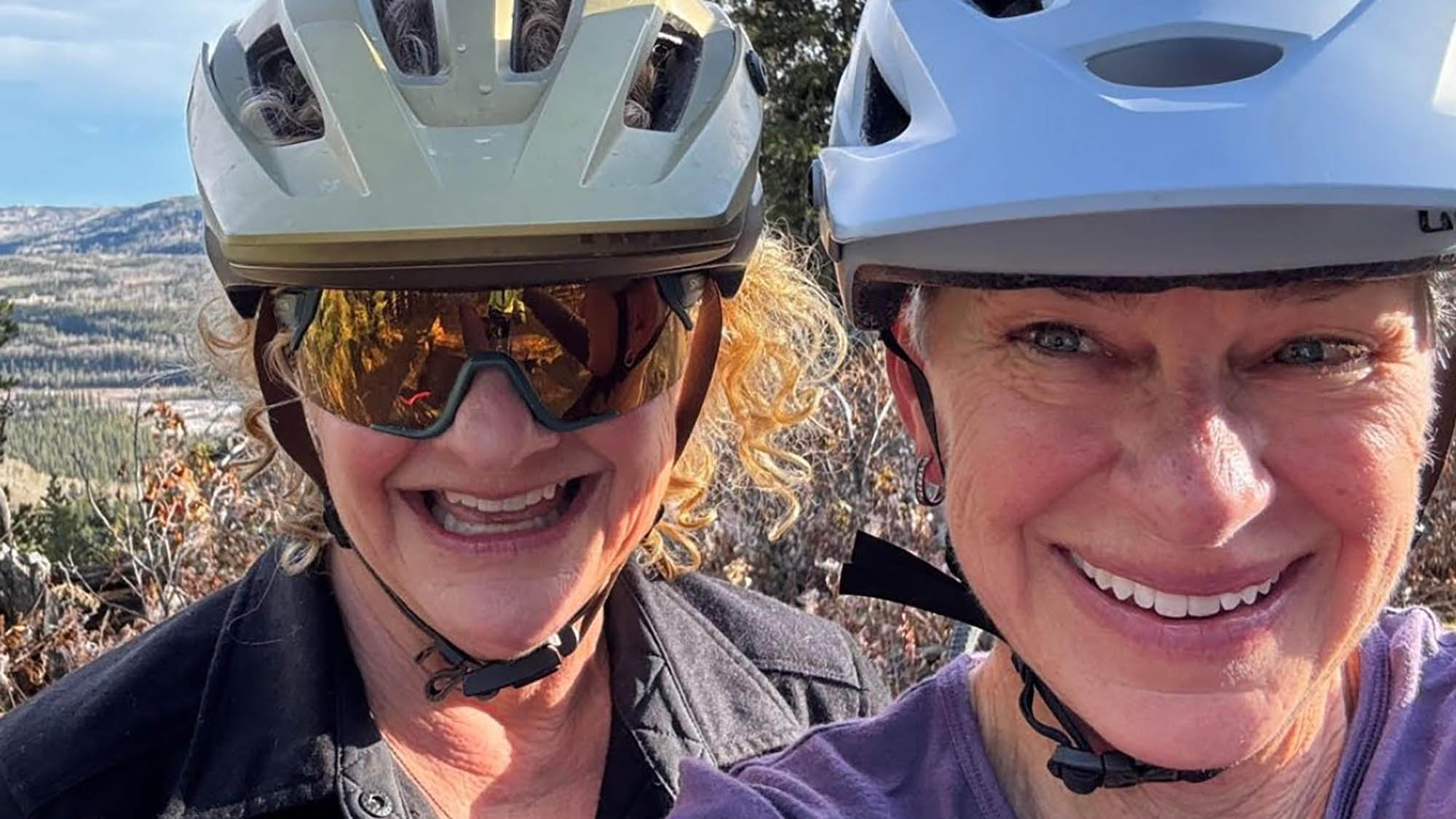Faces of Philanthropy: Alison Jones
Anna Schmidt - 8 November 2024

Alison Jones (left) mountain biking with her sister Alexis Motyka.
In her fourth year at the University of Alberta, Alison Jones, ’85 BSc(Hons), was assigned a required course on Monday evenings. Determined to make the most of the unusual time slot, Jones and five of her fellow geology majors decided to meet for weekly pre-class potlucks.
Gathered around a tupperware-laden table, those half dozen students constituted all the women in the University of Alberta’s geology class of 1985, making up less than 10 per cent of the program. Over the next 40 years, the same six women continued to meet regularly, shifting their dinner gatherings from student housing to downtown restaurants as they grew their careers and families.
For Jones, the camaraderie provided by this group was invaluable. “We all worked at companies where 90 per cent of the people were men. It was nice to have that female companionship and be able to talk to each other about what was going on,” she says.
In the male-dominated oil and gas sector, Jones experienced challenges related to her gender — from her first boss expressing hesitation to hire her because she was a woman, to businessmen directing questions mainly to her male colleagues during meetings.
“Sometimes we worked harder just to prove ourselves,” says Jones of herself and other women in the field. And prove herself she did. The Faculty of Science grad built a highly successful career as a geologist and entrepreneur, and is now helping ensure the next generation of scientists can access the support she fought to find.
In 2019, following decades of generosity to the U of A, Jones decided to direct her support to the Grace Anne Stewart Speaker Series (GASSS). The grassroots initiative aims to connect students and faculty members in the Department of Earth and Atmospheric Sciences (EAS) to a greater diversity of geoscientists through events, networking and mentorship.
“I like to think that if we had had this group, it might have made other women stay in geology or pursue it,” says Jones. “The opportunities that students are now being presented with — getting to meet women and hear their stories — it’s encouraging.”
A small group of graduate students launched the speaker series in 2015, after realizing the department’s diverse student body did not see themselves represented in leadership roles. At the time, only about three per cent of the non-geography faculty in the EAS department were female, while 40 per cent of the students were women. The group named the initiative after the U of A’s first female geology major, Grace Anne Stewart, ’18 BA, ’20 MA, who graduated early in the 20th century.
Thanks to Jones and donors like her, the speaker series is sparking important conversations about equity, diversity and inclusion in the Earth and Atmospheric Sciences department. The group has hosted 30 speakers over the last five years, connecting more than 100 students with academic and industry role models who are underrepresented in geoscience due to their gender, race, ability, sexual orientation or neurodiversity. Sessions have featured a vast range of topics, from how to design fieldwork to be more accessible, to the impact of motherhood on women in STEM.
GASSS also launched a formal mentorship program, providing 88 students with access to an experienced, compassionate mentor. The goals of GASSS over the next five years are to expand mentorship opportunities to all students, enhance networking and support programs, offer EDI training, and provide financial aid to disadvantaged students. Additionally, they aim to host events featuring underrepresented geoscientists to promote diversity in the field.
One student who credits GASSS as being part of his success is Jordan Koop, ’21 BSc, who did his undergraduate degree in the Earth and Atmospheric Sciences department, and is now pursuing his graduate degree. Koop has been involved with the Grace Anne Stewart Speaker Series since 2022, initially as part of the mentorship and advertising team, and now as co-president.
“I’m proud of our efforts to improve visibility and support for underrepresented groups in Earth and Atmospheric Sciences. What’s been most rewarding are the conversations we’ve facilitated and hearing how our work has made people feel more included,” says Koop. “I’ve learned that advocacy is about taking that first step, listening and recognizing how our experiences can help others. This journey has deepened my connection to the community and strengthened my excitement for a career in geoscience.”
Ultimately, the group’s vision is to help the broader field retain minority geoscientists. Even decades after Jones’ experiences with misogyny, this work remains essential. In 2019, the oil and gas sector had the least women in entry level roles and the second least in executive positions compared to 18 other industries, according to research conducted by consulting firm McKinsey & Company .
While the field has a ways to go, Jones reminds the next generation just how much geoscience has to offer. Oil and gas provided her with a rich career that drew not only on her scientific skills, but creativity and business acumen, she says. She remembers a summer student job spent hiking in northeast B.C. looking for coal deposits, before going on to specialize in exploration and development. She was soon directing companies where to drill for petrochemicals, and by 1996, had co-founded an oil and gas company with two fellow U of A grads. They quickly grew the business and garnered national attention before selling in 2001. In 2004, the U of A recognized Jones with the Alumni Honour Award.
“Geology was fascinating to me — it’s the history of the world,” she says. “I’m really proud of the U of A, and I’m proud of the faculty I went to… I always wanted to give back, especially to encourage people to go into geology.”